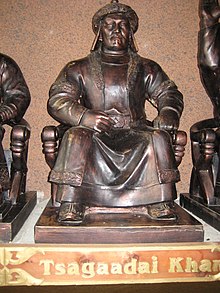Chagatai Khan
| Chagatai Khan | |
|---|---|
| Khan of the Chagatai Khanate | |

Statue of Chagatai Khan in Mongolia
|
|
| Chagatai Dynasty | |
| Reign | 1226 – 1241-42 |
| Predecessor | Genghis Khan |
| Successor | Qara Hülëgü |
| Born | 22 December 1183 |
| Died | 1 July 1242 (aged 58) Almaligh |
| Consort | Yesulun Khatun Togan Khatun Sevinch Khatun |
| Issue |
Mutukan Baidar Yesü Möngke |
| Clan | Borjigin |
| Father | Genghis Khan |
| Mother | Börte Ujin |
| Religion | Tengriism |
Chagatai Khan (Turkish: Çağatay; Persian: جغتای: Joghatai , Mongolian: Цагадай, Tsagadai; 22 December 1183 – 1 July 1242) was the second son of Genghis Khan. He was Khan of the Chagatai Khanate from 1226-1242 C.E. The Chagatai language and Chagatai Turks take their names from him. He inherited most of what are now the five Central Asian states after the death of his father. He was also appointed by Genghis Khan to oversee the execution of the Yassa, the written code of law created by Genghis Khan, though that lasted only until Genghis Khan was crowned Khan of the Mongol Empire. The Empire later came to be known as the Chagatai Khanate, a descendant empire of the Mongol Empire. Chagatai Khan was considered hot-headed and somewhat temperamental by his relatives, because of his attitude of non-acceptance of Jochi as Great Khan. He was the most vocal about this issue among his relations. Chaghatai himself appears to have been a just and energetic governor, though perhaps rough and uncouth, and addicted to hard drinking. At any rate, he was animated by the soldier-like spirit of his father, and succeeded in keeping order among as heterogeneous a population as a kingdom was ever composed of.
In 1232, when sedition showed itself at Bukhara, he acted with promptness, if with severity, and saved his country from a far-reaching calamity. He was, in all probability, an old-fashioned Mongol, for he stood by the Yassa and that he showed little favour to what was, at that time in his dominions, the comparatively new and rising religion of Islam. He must, however, have been fairly tolerant, for it is recorded that his minister for Transoxiana was a Muslim, called the Jumilat-ul-Mulk or Karachar Nevian, and that mosques and colleges were founded during his reign. Chaghatai was neither ever inclined towards Christianity, though that religion, as practiced by the Nestorians, must have been familiar to him.
...
Wikipedia
